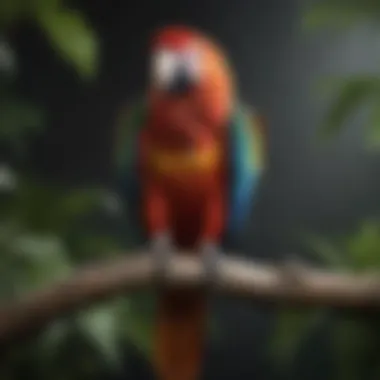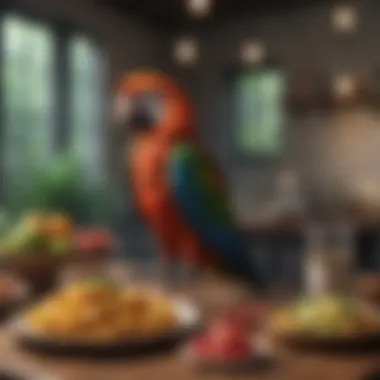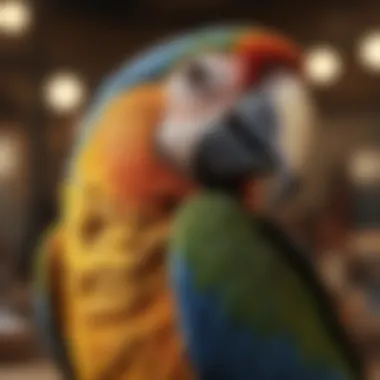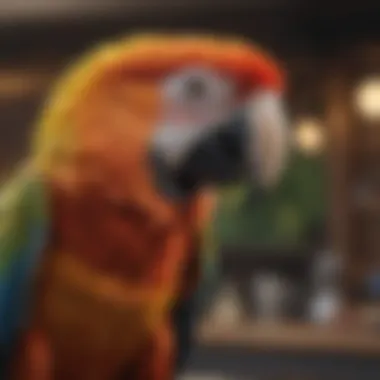Understanding the Cost of a Macaw Parrot: A Comprehensive Guide


Intro
Understanding the cost of owning a macaw parrot goes beyond the mere purchase price. This journey into macaw ownership requires consideration of various elements that contribute to the total financial commitment necessary to provide proper care. Owning a macaw is not just about adding a vibrant, sociable bird to your home; it involves understanding their unique needs, behaviors, and the significant responsibilities that accompany them. As prospective owners weigh the decision to welcome a macaw into their lives, it becomes crucial to have a clear view of what is involved, both financially and emotionally.
Understanding Your Pet
Pet Behavior Basics
Macaws are known for their intelligence and social behavior. Their curious nature often leads them to seek interaction, both with their human companions and other pets. This desire for companionship means that individuals considering ownership must be prepared for a bird that thrives on socialization. Ignoring this need can lead to behavioral issues, which may increase stress for both the macaw and the owner.
Common Breed Characteristics
There are several species of macaws, including the Blue-and-yellow macaw, Scarlet macaw, and Green-winged macaw. Each species has its own distinct traits and personality. For example, Scarlet macaws tend to be more vocal and require ample mental stimulation, while Blue-and-yellow macaws are often described as playful and affectionate. Understanding these characteristics helps in choosing the right breed to match one's lifestyle.
Species-Specific Needs
Species-specific needs for macaws include their diet, habitat, and social interactions. They require a spacious cage, toys for mental stimulation, and a companion, either human or another bird. Such needs should be factored into the overall cost of ownership.
Pet Care and Maintenance
Feeding Guidelines
A proper diet is crucial for a macaw's health. They primarily thrive on fresh fruits, vegetables, and high-quality pellets. The average monthly cost for appropriate food can vary, but budgeting $100 to $200 for nutritious options is a realistic expectation.
Grooming Essentials
Regular grooming is essential to maintain a macaw's feather condition and overall health. This includes providing safe items for them to chew and play with to keep their beaks trimmed and healthy. Additionally, bath time is necessary for them to keep their feathers clean, which can be done using misting or bathing as part of their routine.
Hygiene Practices
Maintaining a clean living environment is vital. The cage should be cleaned regularly, and bedding should be replaced often to prevent sickness. This requires time, effort, and some financial investment in cleaning supplies.
Training and Development
Basic Commands and Skills
Training is an important aspect of macaw ownership. Teaching basic commands contributes to their development and enhances the pet-owner bond. Simple commands such as
Overview of Macaw Parrots
Macaw parrots are not just vibrant and striking pets; they embody a unique blend of beauty and intelligence. For anyone considering these birds, it's crucial to grasp the nuances surrounding them. Understanding macaw parrots goes beyond superficial attraction. Potential owners must appreciate their complexities. The objective of this section is to shed light on these aspects, laying the groundwork for a comprehensive analysis of associated costs.
Species Diversity
Macaws belong to the family Psittacidae, which includes about 17 different species. Each species highlights distinct characteristics, colors, and behaviors. Some popular species include:
- Blue-and-yellow Macaw: Known for its bright blue wings and yellow underside.
- Green-winged Macaw: Distinguished by its striking green feathers with red accents.
- Scarlet Macaw: Renowned for its vibrant red, yellow, and blue coloring.


This diversity in species can directly influence the cost of ownership. Each species carries its own price tag based on availability and popularity. Moreover, specific traits such as rarity or demand can drive up costs further. Understanding which type of macaw aligns with personal preferences and lifestyle is vital before making a decision.
Physical Characteristics
Physically, macaws are impressive creatures. They can measure between 30 to 40 inches in length, depending on the species. Their strong, curved beaks are designed for cracking nuts and seeds, making their diet specific and sometimes costly.
Key physical traits include:
- Feather Coloration: Vivid colors serve a dual purpose: attracting mates and providing camouflage.
- Size Variation: Larger species may require more space and unique housing solutions.
- Wing Span: Some macaws have wingspans exceeding 3 feet, necessitating ample room for flight and exercise.
These physical features not only contribute to their aesthetic appeal but also their care requirements. Understanding their needs, including space and diet, is essential for potential owners. Being informed about these various aspects ensures a wise investment in these magnificent creatures.
Initial Cost Factors
Understanding the initial cost factors when considering a macaw parrot is crucial for any prospective owner. Macaws are not only beautiful and lively pets but also represent a significant financial commitment. This section focuses on three main components that influence the overall cost of acquiring a macaw: the purchase price, the breeder's reputation, and the age and condition of the bird. Evaluating these aspects helps potential owners prepare for the economic responsibilities of macaw ownership.
Purchase Price
The purchase price of a macaw varies widely depending on several factors, including the species, coloration, and availability. Some species, like the Blue-and-yellow Macaw, may command a higher price than others, such as the Military Macaw. On average, the cost can range from $1,000 to $3,000 or more.
A few factors that directly affect the purchase price include:
- Species Specifics: Rare species or those with unique color mutations often have premium prices.
- Supply and Demand: The popularity of certain macaw species can lead to higher prices due to increased demand.
- Location: Geographic factors can influence the pricing as transport costs and local market conditions play important roles.
Before making a purchase, it is beneficial to research various sources for acquiring a macaw. Reliable pet shops, avian rescue organizations, and licensed breeders can all provide potential options.
Breeder Reputation
The breeder's reputation is another pivotal factor when considering the initial cost of a macaw. Choosing a reputable breeder may increase costs initially, but it can save owners money and complications in the long run.
A few things to consider when assessing breeder reputation include:
- Health Guarantees: Reputable breeders often provide a health guarantee, reflecting their commitment to producing healthy birds.
- Breeding Practices: Ethical breeding practices ensure that the macaws are well taken care of, which may lead to better-tempered birds.
- References and Reviews: Feedback from previous customers can offer insight into the breeder's reputation and reliability.
Selecting a responsible breeder not only ensures a healthy pet but may also mean fewer unexpected expenses down the line due to medical issues related to poor breeding practices.
Age and Condition
The age and condition of a macaw can significantly influence the cost. Younger birds are typically pricier due to their potential for training and bonding with their owners. However, older macaws may also come with benefits, such as established behavior and health history. Understanding these elements will facilitate an informed decision:
- Young Macaws: They are usually more expensive but easier to train. They can form strong bonds with their owners, which can be rewarding.
- Older Macaws: While they may be less costly, potential owners should carefully assess their health and behavior. Knowledge about their previous care can guide new owners.
- Condition: Whether the bird is sick, well-socialized, or aggressive can affect its price. A macaw in poor condition may seem like a bargain but could incur hefty veterinary bills.
Ongoing Costs of Macaw Care
Understanding the ongoing costs of macaw care is crucial for anyone considering bringing a macaw into their home. Macaws are not just beautiful and intelligent birds; they also require a significant financial commitment. These costs extend far beyond the initial purchase price and include daily care, housing, and regular health checks. Knowing these expenses helps future owners prepare for the responsibilities associated with nurturing a macaw.
Food and Nutrition


Proper nutrition is essential for the health and well-being of macaws. Their diet typically includes a blend of pellets, fresh fruits, and vegetables, which ensures they receive adequate vitamins and minerals. The average cost for high-quality bird food can range from $40 to $100 per month, depending on the macaw's size and dietary needs. Fresh produce should be an integral part of their diet as well, which adds to the overall expense.
Feeding macaws appropriately is not just about keeping them healthy; it also influences their behavior and mood. A consistent and balanced diet can lead to increased energy levels, reduced aggression, and longer lifespan. Owners must avoid cheap or low-nutrient options, as these can lead to serious health issues, resulting in higher vet bills in the long run.
Housing Requirements
Size and Type of Cage
Choosing the right cage is one of the most important aspects of housing a macaw. The size and type of cage greatly affect their comfort and overall well-being. A suitable cage must be spacious enough for the bird to move freely, stretch its wings, and exercise. Macaws typically require cages that are at least 3 feet wide and 5 feet tall, depending on their specific species.
Cages made from powder-coated metal are a popular choice. They are durable and relatively easy to clean, helping to maintain hygiene. Ensure the bars are spaced appropriately to prevent escape or injury. Although these cages can be more expensive, they offer long-term benefits by providing safety and comfort for macaws. On the downside, some might find the initial investment substantial.
Location Considerations
The location of the cage within your home is also an important factor. Macaws are social creatures that thrive on interaction. Placing the cage in a living area allows them to engage with family members more. However, it is essential to avoid areas with direct sunlight or drafts, which can harm the bird.
Choosing the right spot might also mean considering the noise levels of a household. Macaws can be quite vocal, and their sounds might be disruptive in certain settings. Weighing these factors beforehand ensures that both the macaw and family can coexist comfortably.
Healthcare Expenses
Routine Vet Visits
Routine veterinary care is vital for macaws to ensure their happiness and longevity. Regular check-ups help prevent potential health issues, keeping them in optimal condition. The average cost for a vet visit can vary between $50 and $200, depending on the services provided. Many owners find it beneficial to budget for annual wellness exams, which includes vaccinations and health screenings.
Taking a proactive approach through preventive care can save money in the long run. Catching health problems early can reduce the need for more expensive treatments later. Additionally, finding a vet that specializes in avian medicine may be an investment worth making.
Emergency Care
Emergency care is another aspect of expenses that owners should be prepared for. Accidents and sudden illnesses can occur without warning, resulting in potentially high costs. Emergency vet visits often range from $200 to over $1000, depending on the treatment required.
The unpredictability of emergencies necessitates having a financial safety net. Setting aside funds for unexpected health issues can ease the burden in stressful situations. Moreover, owners must conduct their research in advance to identify nearby avian veterinarians, ensuring immediate access if a crisis arises.
Being well-informed about ongoing costs helps in responsible ownership, ensuring that all aspects of macaw care are covered.
Additional Financial Commitments
Additional financial commitments are essential aspects of owning a macaw parrot. Understanding these expenses can significantly impact a prospective owner’s decision. Owning a macaw is not just about the initial purchase price; it encompasses various ongoing expenses that can add up. The two major aspects to consider are training and enrichment, as well as insurance options.
Training and Enrichment
Training and enrichment are crucial for the mental well-being and happiness of a macaw. These birds are intelligent and require stimulation to thrive. Regular training helps reinforce bonds with their owners and can prevent behavioral issues. Owners may need to invest in classes or professional trainers, which can vary in cost based on experience and location.
Enrichment includes toys and activities that encourage natural behaviors like chewing and foraging. High-quality toys designed for macaws can be expensive but are important for keeping them engaged. Investing in this aspect of care can result in a happier and healthier pet. Owners should also consider the time commitment involved in training and providing enrichment. Daily interaction can greatly enhance a macaw's quality of life, but it requires ongoing attention and consistency.
Insurance Options
Pet insurance is another key financial commitment to consider when bringing a macaw into your home. While not as commonly thought about with birds as with dogs or cats, having insurance can save a significant amount in veterinary bills. Coverage can differ widely, including factors like routine check-ups, accidents, or emergencies. Comparatively, insurance for macaws might cost less than for other pets but can be invaluable.


Not all pet insurance policies specifically cover birds, so researching options tailored for avians is essential. Some policies will have exclusions, such as pre-existing conditions, and may not cover exotic or specialty medicine. Proper insurance gives peace of mind, especially given the potential for unexpected health issues.
Important Note: Owning a macaw is a long-term commitment with ongoing financial implications. Always plan for training and healthcare needs to ensure a enriching experience.
Understanding these additional financial commitments is vital. It allows future owners to prepare adequately and embrace responsible ownership. Planning will enhance the bond with the macaw as well as maximize the quality of life for both pet and owner.
Long-term Financial Considerations
Understanding the long-term financial considerations of owning a macaw parrot is crucial for potential owners. Macaws are not just an intermittent expense; they are a decades-long commitment, often living between 30 to 50 years, depending on the species and care provided. This extensive lifespan signifies that their financial needs will evolve, becoming a significant part of one’s budget.
Lifespan and Lifecare Costs
The lifespan of a macaw is impressive yet demands continuous financial input. A healthy diet for a macaw can amount to substantial monthly expenses. Owners should prioritize high-quality pellets, fruits, and vegetables, which often cost more than basic feed. Typical monthly food costs range from $30 to $50, depending on the dietary preferences of the bird.
Beyond nutrition, companionship and mental stimulation are essential for a macaw's well-being. Engaging toys and activities also incurr costs. Expect to spend an additional $25 to $75 monthly for durable toys and enrichment items across the years.
Healthcare is another crucial aspect of long-term care. Routine veterinary check-ups can cost between $50 to $150 annually. Macaws may also require annual vaccinations or preventive care, which can add to the total. When considering the lifespan and care expenses, the long-term financial commitment for a macaw can easily exceed $10,000 to $20,000 throughout its life, not considering emergencies or unexpected health issues.
Unexpected Expenses
Unexpected expenses can arise at any moment, which makes budgeting for a macaw especially important. Emergencies can include illnesses, accidents, or other unforeseen circumstances. Medical emergencies are often a factor many new owners overlook. A single emergency vet visit may cost anywhere from $100 to several thousand, depending on the complexity of the treatment required.
Important: Always consider an emergency fund dedicated to your macaw's needs to avoid financial strain if sudden veterinary care is necessary.
Other potential unexpected costs include replacements for lost or damaged cages, which may range widely, but can be $500 or more for decent options. Similarly, travel costs can arise if you need to board your pet or seek pet-friendly accommodations. These costs can accumulate, further impacting your budgeting for macaw ownership.
With clear foresight, owners can better prepare for the long haul. Understanding these considerations can ensure that providing a stable and loving environment for a macaw remains feasible.
End
In concluding this exploration of the costs associated with owning a macaw parrot, it is crucial to reflect on the various elements that contribute to informed decision-making. Purchasing a macaw is not merely about the initial price; it involves a commitment to a unique creature that may live upwards of 50 years, depending on the species. This longevity translates into extensive planning for the financial responsibilities that come along with macaw care.
Informed Decision Making
A well-thought-out approach to owning a macaw entails extensive research. Prospective owners should weigh the costs against the benefits. Acquiring a macaw requires a thorough understanding of not just the monetary aspects but also the emotional and time investments. Knowledge about species diversity, dietary needs, and social behaviors can lead to choices that foster both owner satisfaction and the well-being of the bird.
Factors that often go overlooked include:
- Ongoing care and nutritional needs
- Financial requirements for veterinary visits
- Importance of environmental enrichment
Engaging with communities on platforms like reddit.com or reading reputable articles can enhance one’s understanding. Such resources ensure that decisions are well-informed, minimizing the risk of impulsive actions that could lead to regret.
Responsibility of Ownership
Owning a macaw parrot brings enormous responsibility. These birds require a dedicated owner who can meet their needs. Macaws are intelligent and social creatures. They thrive in a stimulating environment and require regular interaction. Understanding this obligation is essential for any potential owner.
Responsibilities include:
- Regular training sessions to ensure good behavior
- Consistent vet check-ups to monitor health
- Creating a safe, engaging environment to prevent boredom and destructive behaviors
Neglecting these responsibilities can lead to significant emotional and physical repercussions for the bird. Therefore, potential owners should prepare for the realities of macaw care and recognize the long-term commitment they are making. Having a macaw is more than owning a pet; it means becoming a lifelong caregiver.
The journey of owning a macaw is rich with joy and challenges. However, it is imperative to recognize the weight of responsibility that comes with such a vibrant addition to your home.







